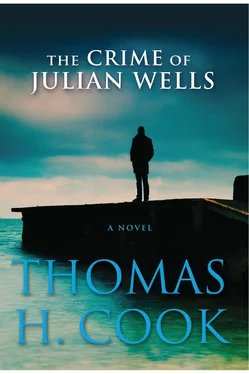Thomas Cook - The Crime of Julian Wells
Здесь есть возможность читать онлайн «Thomas Cook - The Crime of Julian Wells» весь текст электронной книги совершенно бесплатно (целиком полную версию без сокращений). В некоторых случаях можно слушать аудио, скачать через торрент в формате fb2 и присутствует краткое содержание. Год выпуска: 2012, ISBN: 2012, Издательство: Grove Press, Жанр: Криминальный детектив, на английском языке. Описание произведения, (предисловие) а так же отзывы посетителей доступны на портале библиотеки ЛибКат.
- Название:The Crime of Julian Wells
- Автор:
- Издательство:Grove Press
- Жанр:
- Год:2012
- ISBN:9780802194589
- Рейтинг книги:5 / 5. Голосов: 1
-
Избранное:Добавить в избранное
- Отзывы:
-
Ваша оценка:
- 100
- 1
- 2
- 3
- 4
- 5
The Crime of Julian Wells: краткое содержание, описание и аннотация
Предлагаем к чтению аннотацию, описание, краткое содержание или предисловие (зависит от того, что написал сам автор книги «The Crime of Julian Wells»). Если вы не нашли необходимую информацию о книге — напишите в комментариях, мы постараемся отыскать её.
The Crime of Julian Wells — читать онлайн бесплатно полную книгу (весь текст) целиком
Ниже представлен текст книги, разбитый по страницам. Система сохранения места последней прочитанной страницы, позволяет с удобством читать онлайн бесплатно книгу «The Crime of Julian Wells», без необходимости каждый раз заново искать на чём Вы остановились. Поставьте закладку, и сможете в любой момент перейти на страницу, на которой закончили чтение.
Интервал:
Закладка:
So if she had indeed been a Montonero operative, what information had she brought to Vargas, I wondered, and from whom had she received it? The answer was that her information would have been of little value and she herself of little importance as a spy.
Such is what any Casa Rosada agent would have seen on first glancing at Marisol.
But what might he have seen, I wondered, if he’d done a double take?
The Skype screen flickered slightly, but I could see my father quite clearly. He was wearing a burgundy robe with a velvet lapel, and it struck me that he looked much more like some retired CIA chief than a lowly State Department functionary. Because of that, I wondered if he might sometimes still be captured by the Walter Mitty fantasies Hendricks had mentioned, a man who, in his private moments, assumed an imaginary role far more important than any he’d ever actually had.
“I spoke to your friend, Hendricks,” I told my father. “He thinks that Marisol might have been a Montonero operative of some sort.”
I half expected my father to laugh at this, but instead he only nodded. “Well, it can be seductive,” he said. “The world of intrigue.”
I took him through the details of my talk with Hendricks, Casa Rosada’s suspicions that Marisol was a spy who had kept her ears open while working for the American consulate. Then I added the odder supposition that she might have been a far more important figure, her lowly guide job merely a mask.
“What might she have been?” he asked.
“She seems to have been associated with a very bad guy,” I said. “His name was Emilio Vargas. He was from the Chaco, like Marisol.”
My father didn’t seem at all surprised by what to me still seemed an outrageous conjecture.
“It’s easy to get caught up in a revolution,” he said in his most worldly tone. “It’s a very heady business. Especially for the young. You start to imagine yourself a Mao or a Lenin, the savior of your country.”
I recalled what Harry had said about Julian’s book on Chikatilo, how he’d gone to some lengths to detail the killer’s elaborate fantasies, the serial killer and sexual psychopath as savior of Mother Russia.
“It has a terrible allure, being part of a secret army,” my father added. “It’s possible that Marisol could have been swept into something like that. Youth is a minefield, after all. Even Julian was attracted to the idea of being a secret agent.”
This was true, of course. Even before our trip to Argentina, he mentioned “secret gears,” which I took to mean some sort of intelligence work. But he appeared to drop any interest in such a life after Argentina.
“What part of that sort of work interested him?” I asked.
“Deception,” my father answered matter-of-factly. “Disinformation, that sort of thing. Playing psychological games. He thought himself quite clever, you know.”
“Very clever, yes,” I said.
“He thought he would be best at winning someone’s confidence,” my father added. “Particularly in a one-on-one situation.”
I thought of the times I arrived at the exact time and place of rendezvous only to find Julian and Marisol already waiting for me, sitting at some little table, their glasses half-empty, so it was obvious that they’d been there for quite a while.
“Hendricks gave me the report Casa Rosada had on Marisol,” I said. “It makes it pretty clear that Marisol never had contact with anyone who would been of interest to the Montoneros while she worked as a guide for the American consulate.”
I stopped cold as the thought hit me, worked it through, then stated it.
“No one except for me, that is,” I told my father. “And Julian.”
“Why would the Montoneros have had any interest in you or Julian?” my father asked.
“Because we were connected to you, Dad,” I answered.
My father said nothing, but I could see his mind turning this over.
“We would have been the perfect targets, wouldn’t we?” I asked. “If Marisol had actually been a spy.”
“But how would she have known that you and Julian were connected to me?” my father asked.
“Well, for one thing, she heard Father Rodrigo mention you,” I answered. “And beyond that, I once heard Julian describe you as something of a mentor. As a matter of fact, he even suggested that you were a little higher up in the department than you were.”
“Did he?” my father asked softly.
“Yes, and I also remember him telling her about our house,” I added. “He described it pretty grandly, so she might have gotten the idea that you were quite powerful, the center of an influential circle.”
“How ironic,” my father said quietly. “Since I was never anything but-”
“Julian had a picture of Marisol with Emilio Vargas,” I interrupted. “Where would he have gotten it?”
“From someone in Casa Rosada, I suppose,” my father answered. He appeared to run a curious possibility through his mind. “He might have gotten it from my contact there.”
“You had a contact in Casa Rosada?” I asked, surprised that he’d even lightly touch such cloak-and-dagger operations.
“She was only a clerk,” my father added quickly. “She’s in her eighties now.”
“So no longer a Casa Rosada functionary, of course.”
“Not for many years,” my father said.
“Where is she now?”
“Why do you want to know that, Philip?”
“Because this contact of yours might have some idea of who Marisol was, what she was doing,” I answered. “She might know if any of this is true about her, that she was. . a deceiver.”
My father drew in a long, slow breath. “She went back to Hungary,” he said. “You should be aware that hers was not a clean record. You’ve probably never heard of the Maros Street hospital massacre.”
It occurred in Budapest, he went on to tell me, a peculiarly monstrous incident during the last-ditch effort by the collaborationist Arrow Cross to annihilate the few Jews not yet deported from Hungary. Having taken control of the city in the wake of the retreating Germans, the men of the Arrow Cross Party went on a rampage, and among the victims were the most helpless of the city’s remaining Jews. The poorhouse on Alma Street was attacked, as well as the hospital on Varosmajor. But it was the patients, doctors, and nurses at the Jewish hospital on Maros Street who suffered the full brunt of Arrow Cross cruelty, a full day of slaughter that included torture and murder.
“My contact played a part in it,” my father said at the end of this narrative. “She never denied this. At least that was to her credit.”
“What happened to her after she left Casa Rosada?”
“She returned to Budapest,” my father answered. “She got a job with the American consulate.”
“Her reward for being a spy?” I asked.
My father didn’t answer, but I saw the answer in his eyes, all the dirty little deals he’d known about but never approved of, the ratlines and secret bombings and clandestine overthrows.
“Do you know where she is?” I asked.
“She retired and moved into a small town in what is now Slovakia.”
I was surprised that my father knew this, as he could tell from my expression.
“We were. . friends briefly,” he told me. “Your mother died long before.”
“I see,” I said.
“We met in a restaurant on one of my few trips to Buenos Aires,” he added. “Each time I went there, I saw her. It was never love.” He shrugged. “But she worked in Casa Rosada, and so I. .”
“Played the secret agent?” I asked.
My father nodded with the sadness of one who had run out of fantasies, a Walter Mitty no longer inclined to daydream.
“Foolish,” he said softly. “It was all very foolish.”
Читать дальшеИнтервал:
Закладка:
Похожие книги на «The Crime of Julian Wells»
Представляем Вашему вниманию похожие книги на «The Crime of Julian Wells» списком для выбора. Мы отобрали схожую по названию и смыслу литературу в надежде предоставить читателям больше вариантов отыскать новые, интересные, ещё непрочитанные произведения.
Обсуждение, отзывы о книге «The Crime of Julian Wells» и просто собственные мнения читателей. Оставьте ваши комментарии, напишите, что Вы думаете о произведении, его смысле или главных героях. Укажите что конкретно понравилось, а что нет, и почему Вы так считаете.












